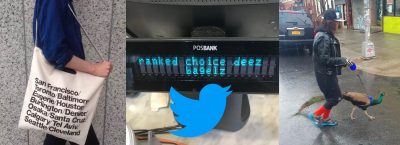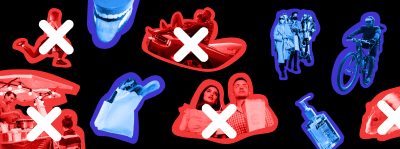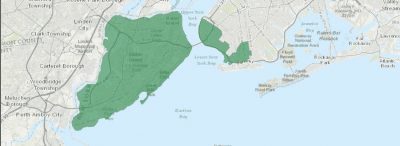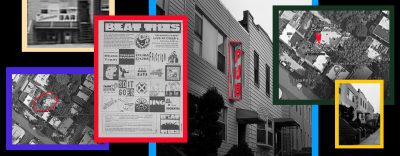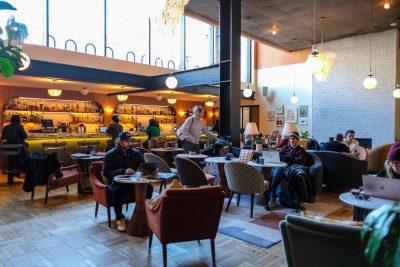A look back at 50 years of Community Bookstore
Park Slope’s iconic indie bookstore has survived Barnes & Noble and Amazon—and now, half a century and a global pandemic too
Just a few Saturdays ago, a woman strolled up to Park Slope’s Community Bookstore, pushing one child in a stroller and keeping a close eye on the other. Shaded by the store’s sun dyed, green awning, she leaned over the table blocking the entrance, squinted her eyes and mouthed the words printed on the covers of the books sitting on the closest shelf inside. She was desperate to go in, something she hasn’t done since the start of the pandemic.
But if she shows up this Saturday, she’ll be able to. As of April 24, the beloved Seventh Avenue bookstore, which turns 50 this year, has finally reopened for weekend indoor browsing.
“It’s wonderful to return to our primary functions, which are talking to people about books, having conversations about books and guiding people to books,” says Ezra Goldstein, who, since 2011, has co-owned the store with his business partner Stephanie Valdez. “It’s great to start selling the hidden gems again.”
For the time being, the store is fully open from 10 a.m. to 5 p.m. on Saturday and Sunday of each week. On weekdays, however, Community Bookstore will still only be open for pickup and door-side sales.
Community Bookstore claims to be the oldest operating independent bookstore in Brooklyn (the oldest in all of New York city is Argosy Book Store in Manhattan). It’s known for its high-quality, eclectic collection of books, comforting ambiance, impressive literary events and variety of pets. Over the years, the bookstore has housed dogs, cats, rabbits and even a bearded dragon lizard.
“Community has been my local bookshop for more than 15 years, and I’ve probably purchased more books from them than any other store in the city,” says Adrian Tomine, an author, cartoonist and regular New Yorker cover illustrator, who recently spent an afternoon sitting in Community Bookstore signing copies of his book, “The Loneliness of the Long-Distance Cartoonist,” which was published in summer of 2020.
“As an author, I think of independent bookstores as the ideal place for my books to be displayed and sold,” says Tomine. “When I design a book cover, I envision someone browsing around in a store like Community and picking the book up off the table.”
Since it first opened by couple Susan and John Scioli in 1971, Community Bookstore has served as a haven for local literary buffs, a gathering place for community members and a fixture amid an ever-changing neighborhood.
“It would be hard to imagine Park Slope without Community Bookstore,” says Goldstein. “Park Slope was a completely different neighborhood in 1971, but the store has not changed very much at all. It’s always been a very literary store and a very high-end bookstore in terms of the quality of the books sold.”
Goldstein and Valdez are Community Bookstore’s third owners. It was sold to Goldstein by Catherine Bohne, a long-time store manager who bought it in 2001 from Susan.
A neighborhood in transition
Richard Nixon was president when Community Bookstore opened. The average cost of a new home was $25,250. The year before, the darkly hilarious satire “The Landlord,” shot in pre-gentrified Park Slope, painted a strikingly different portrait of the neighborhood: Back then, Park Slope was a neighborhood in transition, says Susan. Seventh Avenue was still mostly lined with empty storefronts and old Irish bars. But a few local stores, including Back To The Land, a celebrated health food store that closed in 2018 after 47 years of operation, were beginning to emerge on the block. There was a growing consumer base and a lack of local booksellers.
“We built the shelves and hand-painted the sign,” says Susan. “With a total investment of about $6,000, we opened for business.”
The store’s first big seller was “The Whole Earth Catalogue,” a popular American counterculture magazine known for its product reviews and DIY how-to guides that Susan calls a “bible and icon of the times.” In the early 1970s, Community Bookstore sold hundreds and hundreds of copies of the magazine at $5 a pop. The first thrill of success.
In 1980, the Sciolis divorced, and John went on to manage their second location, which the couple opened in 1974 on Montague Street in Brooklyn Heights. John would later move the second Community Bookstore to Court Street in Cobble Hill, where it operated until John closed the store in 2016.
The Sciolis’ separation meant that the Park Slope location was left entirely to Susan. And with Susan at the helm, Community Bookstore evolved into the hub that it is today. She curated one of the borough’s most tasteful collections of books and created a (now-closed) cafe in the back of the bookstore, which turned the store into a community gathering space to read, meet people, hang out and have a drink.
Susan also put together hundreds of literary events that featured some of the nations’ most celebrated authors and attracted thousands of guests living in and beyond Park Slope. Toni Morrison, Kazuo Ishiguro and Neil Gaiman have all spoken at the shop. In 2016, Patti Smith partnered with Community Bookstore to speak about her book “M Train” at the nearby Congregation Beth Elohim. Three years later, she returned to introduce her book “Year of the Monkey.”
Community Bookstore has also served as the set to multiple television and movie productions. In 2012, comedian Louis C.K. filmed a scene for his show “Louie” at the bookstore. Two years later, Paul Rudd and Amy Poehler used the bookstore as the set for a scene of their movie “They Came Together.”
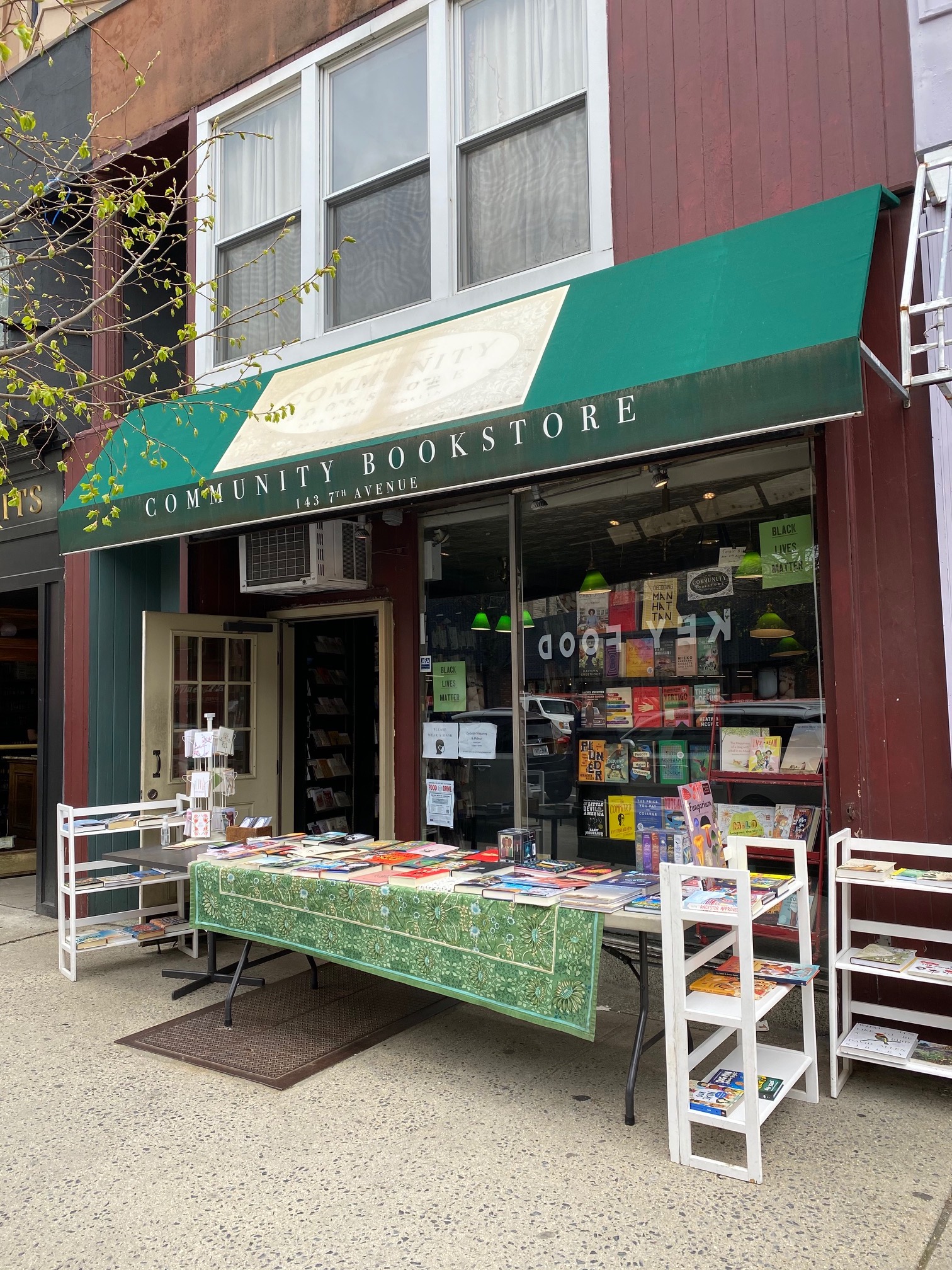
Indie in the age of Amazon
As its name suggests, Community Bookstore is a staple in the neighborhood of Park Slope. Throughout the years, the store and the local community have developed a symbiotic relationship. They’ve been there for each other in times of need. Without each other, neither would be the same.
Just a few weeks after Susan sold Community Bookstore to Bohne in 2001, 9/11 hit. Following the tragedy, Community Bookstore became a gathering place and information center for the neighborhood, says Goldstein. News and resource information was posted throughout the store, and those who needed help were pointed in the right direction.
Since 9/11, Community Bookstore has faced its own fair share of obstacles, including the rise of Amazon, a Barnes and Noble moving in down the street and, most recently, the pandemic. Due to the community’s continuous support of the bookstore, it has been able to hurdle each barrier.
“Independent bookstores, in general, are fixtures of communities all around the country and around the world,” says Goldstein. “Wherever you have a neighborhood with a bookstore, people coalesce around it. It’s just a phenomenon that happens. It’s one of those key institutions to building a neighborhood and keeping a neighborhood together. And Community Bookstore has served that function in Park Slope since 1971.”
You might also like 

















